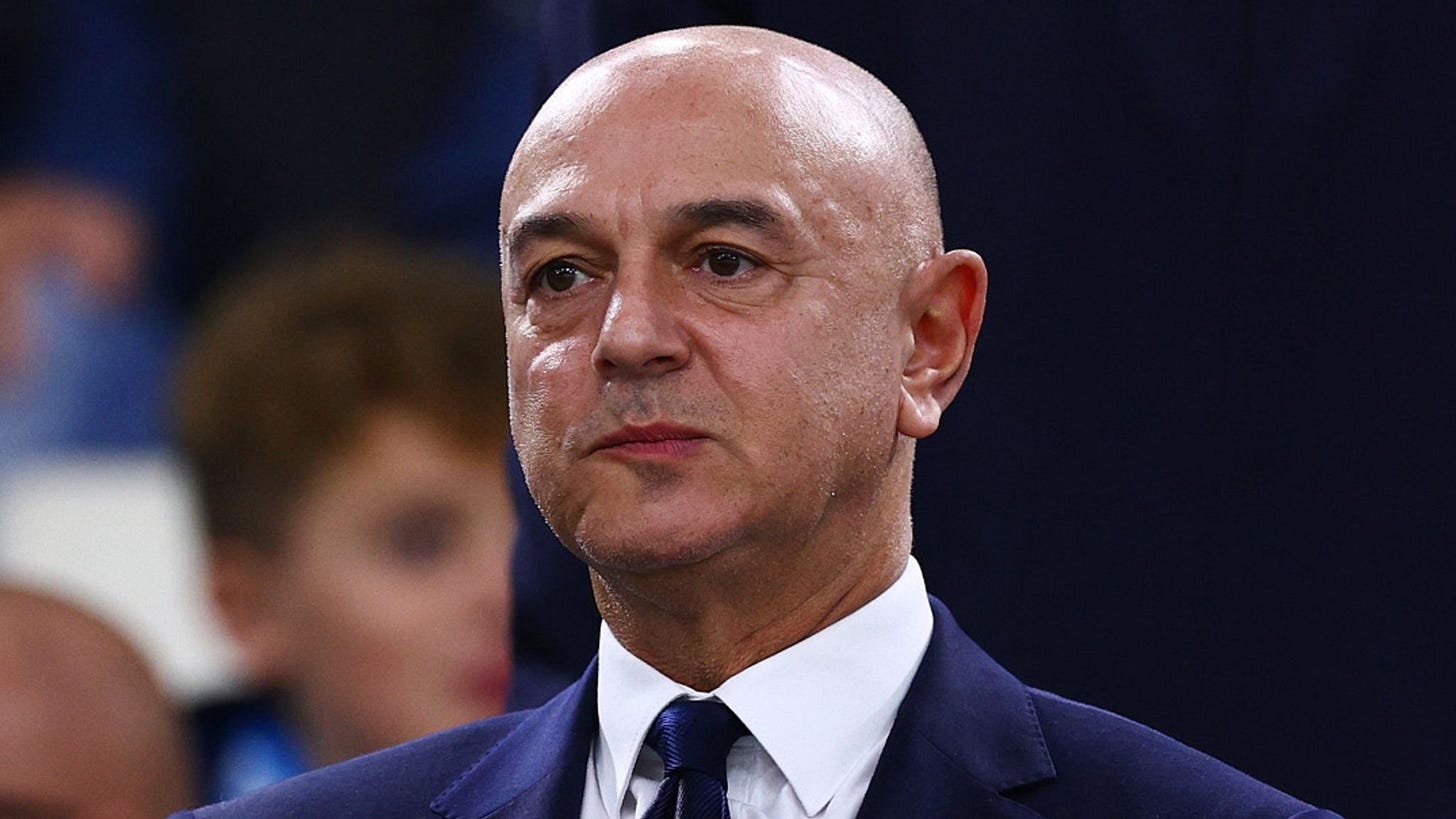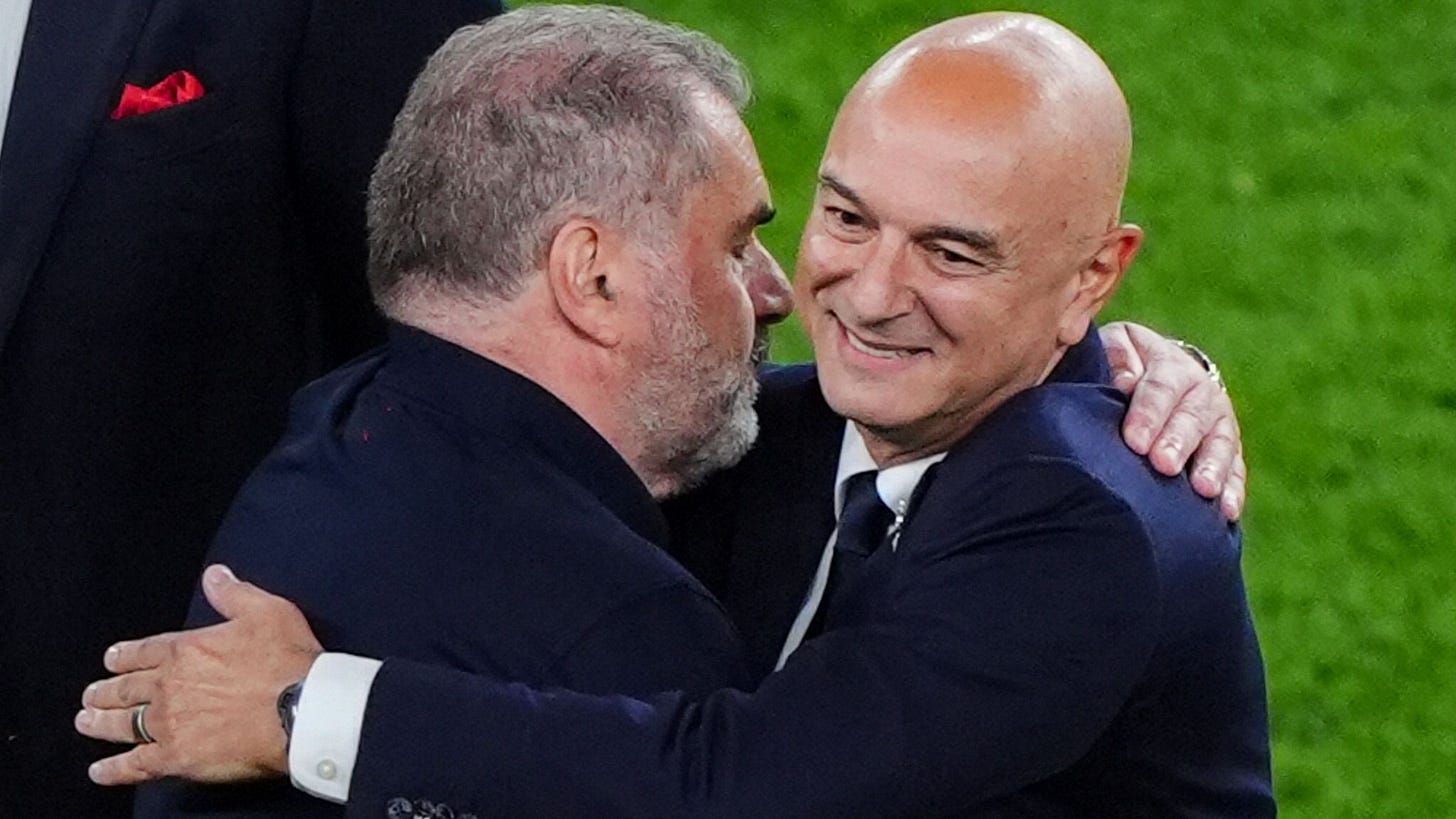Daniel Levy Opens Up: Ambition, Regulation and the Future of Tottenham
From Ange’s exit to financial fair play, Daniel Levy explains why Spurs’ path to glory must be built on stability, not recklessness
Daniel Levy Breaks His Silence
When Daniel Levy sits down for an interview, the football world tends to lean in. For all the protests, petitions, and pointed criticism from sections of the Tottenham Hotspur fanbase, Levy remains one of the most influential figures in the Premier League. Speaking to Gary Neville on The Overlap, in an interview hosted at the gleaming Tottenham Hotspur Stadium, Levy gave perhaps his clearest insight yet into his footballing philosophy, the challenges facing the game, and why he believes Spurs’ future under Thomas Frank is one worth backing.
The conversation was more than just a PR walk through corporate boxes and South Stand rails. It was Levy in his most candid mood, touching on everything from the financial pressures in modern football to the decision to part ways with Ange Postecoglou despite a European triumph.
The Ange Decision: Trophy Joy but Premier League Pain
Levy did not shy away from the most contentious recent decision of his tenure, parting ways with Ange Postecoglou just months after the club lifted the Europa League. “We can’t lose sight of the fact we finished 17th in the league,” Levy told Neville. “We lost 22 Premier League games and it’s impossible for Tottenham to be in that position.”
The words are blunt, almost ruthless. Yet, they capture the hard reality Levy insists drives him. For all the romance of silverware, he sees league performance as the truest measure of progress. It is a cold metric, but one he believes is necessary if Spurs are to match their stated ambition of winning the Premier League and Champions League.
There is an argument that this outlook underplays the emotional lift a trophy can bring. For a club that has lifted just two trophies in over two decades, momentum and morale matter. Still, Levy frames it as a strategic fork in the road. Postecoglou’s cup success could not mask a domestic collapse, and sentiment would not be allowed to cloud judgement.
Thomas Frank and the Measured Push for Success
If Ange was the romantic gamble, Thomas Frank is presented as the steady project builder. Levy was careful to note, “We haven’t said to him, you’ve got to win the league this year… all we know is he has to win it as soon as possible, but no pressure.” The line, half serious, half knowing wink, tells its own story.
Levy believes Frank’s strengths lie in developing both young and established players, instilling a clear style of play, and communicating effectively. It is a manager profile rooted in culture and sustainability rather than short bursts of investment driven success.
On whether Frank will get the resources to compete with the financial giants, Levy insisted Spurs have been “in the top four spenders since the stadium opened,” citing close to £700 million net in player investment. It is a point aimed squarely at critics who accuse him of penny pinching.
The Stadium as Legacy and Weapon
Levy’s pride in the Tottenham Hotspur Stadium is unmissable throughout the interview. The sheer level of detail, from crushed White Hart Lane concrete underfoot to an on site brewery, reflects the chairman’s meticulous nature. “When I’m not here, I’m sure I’ll get the credit,” he said, with a mix of humour and resignation.
Neville called Levy “the best operator in football” when it comes to controllables like stadiums, training grounds, and revenue streams. The chairman knows it. He sees the stadium as not just a symbol of Spurs on the global map but as a competitive weapon. Matchday revenues, NFL partnerships, concerts, and events all form part of a business model designed to make Tottenham self sufficient in competing with state backed or debt fuelled rivals.
Yet, this pride in infrastructure feeds directly into one of the biggest criticisms Levy faces, that he runs Spurs like a business first and a football club second. Levy rejects that entirely, claiming he does not interfere in player selection or tactical matters. His job, as he frames it, is to back the chosen coach in the market, not dictate the footballing decisions.
Financial Sustainability and the State of the Game
Levy’s comments on football’s financial regulation were some of the most striking. On other clubs’ aggressive spending, he remarked, “I wouldn’t say they’re crazy, but I think it’s not sustainable.” In his view, rules around spending caps, wage to turnover ratios, and amortisation are not only necessary but will ultimately make the game healthier in the next two to three years.
The Premier League’s Profitability and Sustainability Rules (PSR) are often painted as shackles on ambition. Yet Levy positions Spurs’ gradual growth as proof that success can be built without reckless spending. It is, of course, easier to defend such regulations when you are among the clubs already benefiting from higher revenues and modern facilities. For owners of Newcastle or Aston Villa, locked out of matching spending power due to lower turnover, the ceiling feels far less fair.
Where Levy is most forceful is on “related party sponsorship” — deals between state owned clubs and entities linked to their owners. “It puts them in a very competitive advantage compared to everybody else,” he said, calling for tighter controls, ideally on a European scale.
The EFL Deal and the Cliff Edge Debate
One of Neville’s persistent challenges to Levy was on the “cliff edge” between divisions, the vast revenue gap that fuels the parachute payment system. Levy accepts the principle of parachutes but concedes the system needs “a fairer curve from top to bottom.” He also supported mandatory relegation clauses in player contracts to ensure wage bills adjust instantly after demotion.
What came through strongly was Levy’s belief that many owners will not act for the greater good without being forced to. “Sometimes you may have to give up something for the good of the game,” he said. “We as Tottenham Hotspur would give up some of our revenues if it was for the good of the game over the long term.” It is a noble sentiment, but also one that will be tested when the financial hit is real.
Government Regulation: Necessary or Naïve?
Perhaps the biggest philosophical divide between Levy and Neville came over government regulation. Neville sees it as “the last chance” to protect fans, ticket affordability, and competitive balance. Levy, however, remains unconvinced. “I’m not in favour of government regulation,” he said plainly. He believes the Football Association should have taken a stronger leadership role and fears regulation will bloat costs without delivering genuine improvement.
The tension here is fascinating. Neville argues owners are inherently self-interested, so an external force is required. Levy suggests the clubs can self-regulate if given the right framework. The reality, as history shows, is that football’s powerbrokers rarely agree unless compelled.
Ambition and the Levy Legacy
Towards the close, Neville pressed Levy on his ambitions for the next three years. The answer was clear: “We need to consistently be trying to win trophies… that’s what this is all about.”
It is easy to be sceptical. Two trophies in 25 years is a record that would have seen most chairmen hounded out of other clubs. Yet Levy has also delivered the infrastructure and financial stability that many rivals envy. The challenge now is translating that into footballing dominance.
Levy is betting on Thomas Frank, a stable financial base, and a modern stadium to do what Spurs have failed to do for decades, turn potential into sustained silverware.
Final Thoughts
Gary Neville’s Overlap interview was a reminder of why Levy divides opinion so sharply. To his supporters, he is a visionary who built the best club stadium in the country, kept Tottenham financially stable, and is pushing for fairer rules in a game warped by reckless spending. To his critics, he is a businessman who has mastered the art of self preservation while delivering too little on the pitch.
What cannot be denied is that Levy sees himself as a custodian, not a gambler. In his mind, the trophy count will rise only when Spurs can compete without risking their future. The coming seasons will decide whether that patience pays off, or whether the fans’ protests grow louder than ever.



